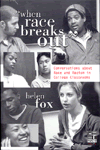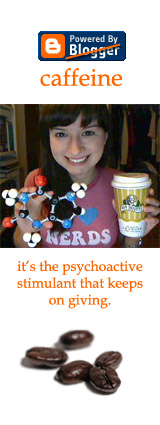As a science teacher, I do not intend to engage my classes in discussions about race, racism, and identity. Indeed, as I read the assigned chapter of Helen Fox’s book, When Race Breaks Out, I found myself envious of my peers who will one day be teaching English and Social Sciences to high school students. I am envious not only because the exercises in Fox’s book seem especially relevant for students who are reading To Kill a Mocking Bird, or who are studying the internment of Japanese Canadians during the Second World War, but also because the subject of race and racism in Canada is a fascinating topic to discuss with young people and unfortunately, my subject does not lend itself to this kind of conversation.*
I console myself with the knowledge that there is always the debate team (that is, if I can wrench the coaching responsibilities away from whomever is lucky enough to have them). I was a high school debater and I loved it. I loved it even though, when I found myself at the national debating seminar, the resolution before us was Be it Resolved That Forestry Will Determine This Country’s Future, and I had to argue about the economics of softwood lumber for two weeks. (In the small Ontarian town of Thunder Bay, where the seminar was held, the ups and downs of the forestry industry were front page news.)
All this to say that Fox’s exercises in media analysis and developing anti-racist arguments really spoke to me. This quotation from a Latina undergraduate made me want to stand up and cheer, yes!
I like that you stress knowing facts. No one can fight you when you know better than they do. I’ve noticed a difference in my ability to communicate more concisely and convincingly. I feel like I’ve got a few missiles in my arsenal. (129)
Yes, yes! I love the idea of empowering students with militant ideas. Let them be intellectual terrorists! Let them take no prisoners! Let them learn to debate with each other respectfully and passionately! This is exactly the sort of activity I had in mind when I wrote about teachers having a positive impact on our national dialogue (see October 12th).
And now that I’ve used my entire exclamation mark quota for the day, I'll describe the one of Fox’s activities that I would most like to discuss, and that is the exercise in media analysis. This choice might seem at odds with my excitement about using debating techniques to help students explore racial issues, but I think that being able to analyze media critically and thoughtfully is a prerequisite to good debate. So much of what we know, or think we know about ethnic minorities comes from the media, and if we are not responsible consumers of that information, then we are truly lost.
Fox recommends presenting students with newspaper articles and challenging them to find biases in the reporting. That is, are certain perspectives left out? Are certain religious or cultural groups stereotyped? I would add the questions, How are you able to make that judgment – how do you “know better”? Do you think the bias is intentional or malicious? Who is the reporter and what are his motivations?
This exercise would not only help students to recognize racism, but it would also encourage them to adopt an attitude of skepticism when they read newspapers and watch television. I think this activity would be particularly powerful when done in conjunction with the magazine analysis, where students discuss the differences in how ethnic minorities are represented in the mainstream media and how they are represented in media written for and by their own ethnic communities. This would not only reinforce the exercise in identifying prejudices, but also encourage students to seek variety in their news sources. The group discussions that result from the media analysis can then be used as a launching pad for any of Fox’s activities for developing anti-racist arguments.
There are few disadvantages to these kind of exercises - I would argue that the ability to think critically about what one reads is among the most important skills a student can learn. It’s a passport for understanding the world. That being said, there are some shortcomings of the above activities, if they are done in isolation, and if one’s purpose is to bring students to a heightened sensibility about racial issues.
That is, the media analysis exercises are largely impersonal. Unlike the discussion topics which require students to examine their own racial identity, their own prejudices and the prejudices that others have against them, the object of critique in the media analysis exercises is an outside party. The student may come to a better understanding of the systemic racism that in prevalent in society and in certain groups, but this is easily divorced from the student’s personal experience. If good media analysis is a passport for understanding the world, the student must also have a passport for understanding himself. The latter is better accomplished by an exercise that examines the student directly.
* In fact, the history of science is filled with examples of racism and sexism. When the science teacher talks about famous experiments and the people who designed them - Einstein, Curie, Bohr, Franklin and the rest - putting these characters into the proper historical context can help make them more real to the students. Particularly for students who feel they are at a disadvantage because of their ethnicity, discussing examples of famous minority scientists might make them more optimistic about their own prospects in science. I think these kinds of discussions would be a small but worthwhile addition to any science curriculum.













2 comments:
K,
As always, a thoughtful and engaged, lively and articulate discussion. I do think that there are opportunities to discuss race as social construction in some science classes, because there are controversial and wildly racist scholarly discussions that go on in regards to intelligence, etc. Or even just the absence of medical research that is conducted on non-white populations (or women, for example...medical research is only just starting to come to the conclusion that women and men might react differently to heart medications, for example). The white male 'normative' has been used as the universal measure in science for a lot of years.
I have no doubt you will continue to be a passionate, informed and engaged teacher, and it's a pleasure to see that educator identity emerge in you.
Lisa
Lisa,
I am aware of the issues you have raised - for instance, the debate regarding intelligence testing, etc (I refer you to my recent blog about James Watson). I wonder, however, how relevant such an issue is to a high-school level science classroom, where the students are only beginning to understand the underlying principles of genetics. My philosophy of teaching tends to put a great deal of emphasis on the basics, expecting that only a very firm understanding of the basics will make it possible for my students to engage in more sophisticated inquiry and discussion later on in their studies. That is to say, one day when they do encounter these complicated and controversial debates in academia, they will be fully equipped to participate meaningfully.
Still, I will try to find appropriate ways to address these important issues.
-Kristen
Post a Comment